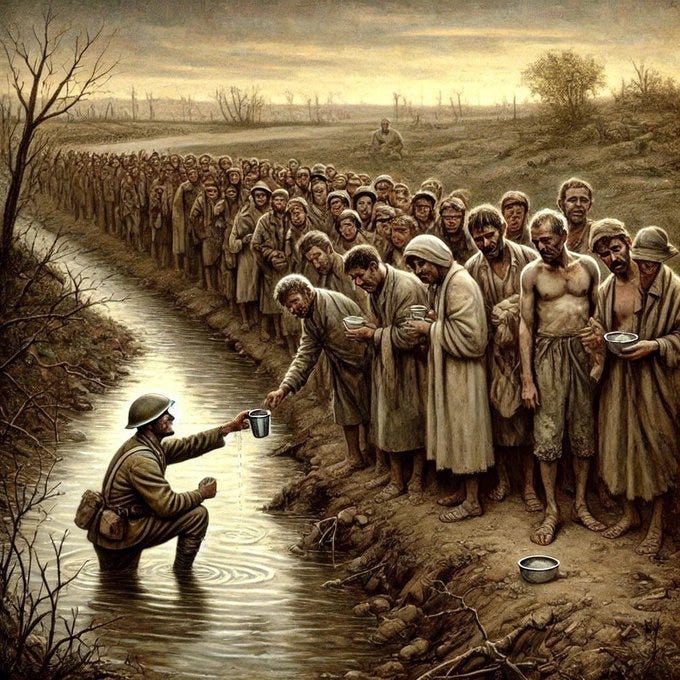My laptop has an integrated webcam cover slide. It’s a pretty neat feature. It gives you some peace of mind knowing that you’re safe, at least from FBI/NSA Facebook backdoors that live-view you and digitally map your face.
But why did the manufacturer do this? What made them waste their profits on research funding and new designs, plus pay salaries for their engineers to come up with, prototype, and quality-test such a feature, before rolling out costly new production lines for it? Why did they get into the expense and hassle of doing this, especially when almost nobody asked for it? Did the almighty all-knowing all-moral government decide that this webcam cover was “for the greater good,” and therefore, had to be imposed to all manufacturers, out of the state’s “benevolence?”
No. They did it because free-market pressures are much more powerful, much more fair, much more efficient, and much more moral than anything the state could enforce through the threat of violence.
How I know that government is totally and undeniably unnecessary
Even the government competes with the free market. Government rushes to impose things that the free market has already adopted freely. For example, when the government gives you its sorry excuse for “education” as a straw-man argument for the state’s alleged “necessity,” the implied suggestion is that corrupt politicians are somehow moral and love you, and that they know and want what’s best for you. Only a gullible idiot would believe this. Instead, the reason they offer some pathetic excuse for “government services” is that the government fears the free market taking over. If the state provides some basic education, the the masses rest assuming that this is as good as it gets. They can’t even fathom that the free market can do it better and cheaper for all.
The corrupt politicians and bureaucrats that constitute government have an incentive to provide some kind of minimal “service” to the public, otherwise the public would finally start wondering why the hell they need government in the first place. So, government has an incentive to compete with the free market. Otherwise the free market takes over, and it gets to decide what happens, how it happens, and why it happens, through free-market dynamics. Then, people would realize that government is truly unnecessary. So, even though government is an enforced monopoly, it still has to “outcompete” the free market with force.
Monopolies still somewhat compete with their alternatives. If you are the only car manufacturer in the world, you still indirectly compete with bicycle manufacturers. Make your cars too expensive or too useless, and people will choose your alternatives. So, even though you dominate one market, you can’t dominate them all.
If an enforced monopoly like the state is still subject to free-market pressures (competition and incentive), then imagine how much more subject a business would be in an environment of free, efficient, organic competition. To assume that “the world would sink into chaos without government” is to deny reality. To think that “warlords would take over” like they already have (politicians), is deluded, because even warlords cannot escape free-market rewards and punishments. If the free market can subdue the biggest monopoly warlord in history (the state), then it can subdue petty gangsters and disorganized gangsters in competition with each other.
By the way, free-market dynamics are moral and efficient, unlike government. They are moral because they run on voluntary incentive rather than threats of government violence. They are efficient because they occur based on free-competition incentives as well as actual organic demand, instead of some bureaucrat’s arbitrary (and corrupt) decision on what to spend and where.
Indeed, the government has to compete against the free market. Even with government monopoly, we still see that even a monopoly has to compete with its alternatives: free-market solutions. This is why government outlaws the provision of most of the services it fails to provide, such as policing, lawmaking and education accreditation. And it’s no easy feat for useless unincentivized government bureaucrats.
People in government have to keep chasing after the free market, and then regulate what the free market has already established.
Take the HACCP standard, for example. The free market achieved that through incentives, and then, the government rushed in to blanket-impose it to take the credit. Then naive people think: “But how would we have health standards without government?”
Granted, had the government not imposed such health standards, we’d still have some businesses without health standards. But so what? Some people might voluntarily choose to eat at a restaurant without certain health standards, if it meant convenience or lower price. Besides, if you have to force a business to uphold a health standard that they wouldn’t have upheld on their on free will, are you sure they’re upholding it well?
In the 1990s, while fat, corrupt, atherosclerotic politicians were arguing endlessly about what to do about the ‘hole in the ozone layer,’ it was the free market that found the solution. The beauty products company Schwarzkopf advertised their new line of products without ozone-damaging CFCs. They had invested in research to produce aerosol products without that chemical, and because there was public sensitivity over the ozone subject, the demand for their products soared. Its competitors rushed to do the same so that they could stay in competition. And then, the government went on to make CFCs in aerosol illegal; and government took all the credit in the minds of the gullible masses. Violence makes more noise than voluntary negotiation. And thus people assume that government is necessary. It is not.
Seatbelts? The free market made them and normalized them due to manufacturers’ free-market incentive to stay competitive. Then government came in to make them mandatory for manufactures to build them into their cars. There was no need at all other than government wanting to make itself relevant where it was never relevant or necessary. Sure, you may argue that government makes it mandatory to actually use the seatbelt, but it doesn’t morally have to at all. An individual choosing to take the risk of not wearing a seatbelt harms no one other than himself and his insurance company. He should take it up with them. For example, insurance could add a clause to not cover him in case of a car accident where it is determined that he was not wearing a seatbelt or a helmet, or whatever. That’s his punishment - no fines or prison time required. Just the loss of the privilege (not a right) of insurance. It’s that simple, moral and efficient. No government is needed; at all.
How about employment regulations? As an employee, I’ve had employers give me bonuses and salary raises without ever asking for them. Why did they do this? Did the “benevolent” god of “the state” force them to do this? No, not at all. They did it because they understood that they competed with other employers in acquiring and keeping good staff. They also understood that employee turnover is a huge cost to any business. This proves that free-market incentives run the economy. There is literally no need for any government to do anything.
Objection
I know what you’re thinking. You’re wondering about what happens when certain employers (not all) completely exploit their employees under inhumane conditions. Yes, this does happen. But I fail to realize how a regulation can stop an employer from doing this. If this employer knows he can mistreat his employees, and still keep them, and still get away with it without his customers punishing him (assuming it’s a free competitive market), then he will definitely get away with ignoring government regulations to treat people better. If the free market doesn’t scare him, then he’ll get around state regulations. And this observably happens: employees do unpaid overtime regularly, and employers still find legal windows ways around regulations to dehumanize and mistreat their people. And government does nothing, because government works for the highest bidder.
Remember that government also creates unemployment via enforcing minimum wages, even though employees are willing to work for less than the minimum wage. An enforced minimum wage creates two things: unemployment for employees too costly to keep in positions of low productivity (hence the low wage), and extra unpaid work for the few employees that are kept, because they need to do the work of those who were fired. This is worse for employees who lose their job because of minimum wage, since they had chosen to work for less rather than not work at all. It means that it was preferrable for them to work for less than to be fired due to the minimum wage increase. And since they become unemployed and thus desperate, many of them resort to working for even less in off-the-books jobs, because government intervention made them even more exploitable. So, if employers can still break labour law by “illegally” hiring people, then government is again unnecessary. What would actually help employees would be a healthy free market without government intervention.
Unemployment by government
If employees are desperate enough to still show up to inhumane work environments, then they are treated as bad as they tolerate to be treated. Yes, they are victims of circumstance; they need to eat, and in their desperation, they are willing to tolerate almost any inhumanity. But, the thing that causes their desperation - government intervention - cannot be the solution.
It is government intervention that slows down the economic cycle with taxes and regulations that create persistent unemployment, which in turn takes away workers’ negotiating power. Unemployment is the amount of cash that leaks from the economic cycle, and stays out of circulation. Unemployment is analogous to the amount of money retained in tax bureaucracy, tax evasion schemes, state embezzlements, and wasteful government spending. Persistent unemployment is the result of government intervention that distort market equilibrium. Unemployment is the wasted economic potential resulting from a distortion of the otherwise balanced economic cycle, and this can only occur through forced government intervention.
Free-market solutions
Government holds a monopoly on certain things like risk management, otherwise known as legislation, policing and judiciary systems. These are nothing other than risk management, something that can EASILY be provided by the free market if we ever decided to get rid of government. Statist apologists will say “but it has never been done in history.”
The answer is, first, that yes, it HAS occurred in history, but it hasn’t been sustainable because some neighboring government would relentlessly attack such societies. Maybe violence is the only thing that government is better at than the free market. This is not a pro-government argument; it is an anti-government argument.
Second, whenever a government collapses, people rush to install a different brand of government with the same essence. It’s because they don’t know any better. They don’t know that there are better, cheaper, more efficient and more moral free-market alternatives to risk management (legislation, policing, judicial systems). If they don’t know how to do it, it doesn’t mean it’s impossible, just like not yet knowing how to get humans to Mars doesn’t mean the feat is impossible.
And remember the same objections emerged when the abolition of slavery was suggested: “How will the economy run? Who will pick the cotton? Who will do the hard work? Who will we feed our families?” Total unsubstantiated nonsense.
Burden of proof
The non-existence of government is the default state of being, the null hypothesis. The existence of a state is the alternative hypothesis, therefore, statism bears the burden of proving that it is better than the default - its non-existence. Where is the evidence? The fact that the entirety of human history is riddled with government is no proof of its efficacy any more than the universal existence of disease is proof that disease is better than health; or that the universal existence of religion is proof of a god (which god, though?).
Where is the proof? Where are the experiments? Have we ever compared two societies of more-or-less equal demographics and resources - one with tight government, and the other with voluntary decentralized stateless systems of self-governance - to see which one results in better economic outcomes and superior morality? No, but we have something close to that.
We have experiments of ‘smaller government versus larger government’:
East Germany vs. West Germany,
North Korea vs. South Korea,
China vs. Taiwan & Hong Kong
Saudi Arabia vs. UAE
Greece vs. Cyprus.
Each of these five examples feature identical populations with the same ethnicity, race, language and culture. They also shared geographical proximity to each other. In all five of these undeniable examples, the side with significantly less government intervention (less taxation, less regulation, less authoritarianism) was consistently more prosperous and more developed; even in cases where the prosperous side was geographically and geopolitically disadvantages (Hong Kong and Cyprus).
West Germany was demonstrably better than East Germany in all areas. Germans from the East were risking their lives to escape to the West. South Korea is much better than North Korea; undeniably. The same applies where North Koreans risk life and limb to escape to the South.
China is objectively a horrible place to live in, despite their desperate propaganda to try to convince us of the opposite. Being a Chinese citizen, overworked and routinely locked down to the point of mass suicide isn’t exactly something to be proud of. And don’t get me started on their totalitarian social credit score bullshit. On the other hand, Taiwan shows a much more prosperous state of being, despite its proximity to the belligerent mainland China. And Hong Kong, before its annexation into mainland China in 2020, was the most free state in the world; a shining example of how free markets thrive, even though it still had some limited government.
Saudi Arabia and the UAE have identical populations, but it’s a treat to be a citizen of the UAE, and a nightmare to be a citizen of Saudi. Why? Becuase the UAE government, despite its authoritarian moral regulations, is fiscally very liberal. Imagine being a citizen of Saudi, the country with the greatest oil reserves in the world, and still having to face unemployment and poverty.
And Greece and Cyprus? Identical populations, but the latter formed an independent state post-British colonialism, with influences of liberal governance. To this day, Cyprus is still more fiscally liberal, and therefore, more prosperous in all areas than Greece; despite the crippling disadvantages of Cyprus’s geopolitical situation.

The bottom line
People tend to end their intellectual pursuits when parroting the mantra “government is a necessary evil” or “it’s the best system we’ve got.” Even if these unsubstantiated assertions were true - they are not - no moral person could be able to rest in evil without at least trying to discover something better.
Even if government were a necessary evil, you should realize that you cannot rest in evil. If you confess that it is indeed evil, then - if you are moral - you must not rest until you figure out ways of making in unnecessary. You should not lean back and rest careless on the mantra that “evil is necessary.” If you are moral, you should instead explore every other alternative to centralized governance, such as voluntary decentralized systems of self-governance.
If you are moral, then you should give every benefit of the doubt to the theory of practice of social order without the need for the perceived “authority” of government.
Thus, if you rest on the withered laurels of “government is a necessary evil” or “it’s the best system we’ve got,” then you cannot be moral, and your opinion shouldn’t matter to moral people.
Even an enforced-by violence monopoly, like the state, still has to keep their customers somewhat happy. This is why we still get some services from government, even though they’re extremely low quality and extremely costly (because government is an enforced monopoly of such services). Look at education, healthcare, roadworks, policing, and everything else. We’d get way more for our buck had that buck been allowed to circulate freely in the economy. In that case, we could get better and less costly education, healthcare, roadworks and policing through a freely competitive market obeying the law of incentive. Competition benefits the consumer most of all.
Government cannot be the solution to the social issues it creates. Government cannot provide welfare to the poor, because government creates poverty in the first place through its interventionist policies. If the government wanted to help poor people, it would limit its intervention in the economy. Government cannot create regulations to help workers when it is government itself that robs them of their negotiating leverage against employers. It is government that creates unemployment through state interventionist policies, thus creating an oversupply of desperate labourers willing to work more for less. If government wanted to help workers, it would abolish tariffs, corporate tax and sales tax. It would lift useless pointless regulations that only serve its big-corpo lobbyists by taking out their competition: smaller businesses. So, not only does the government harm workers, it harms consumers too through the monopolies it helps create - deliberately, no less.
But government will not do that; it won’t reduce its interventionism. Government is consciously evil. It is a violent tool for the oligarchs to lobby and hijack for their benefit at the expense of the rest.
But hey, don’t blame the big fish. The small fish, the gullible voters, are also to responsible. Your average citizen also seeks to slyly use government for special privilege at the expense of his neighbour. This is what voting is: the intent to use the state’s monopoly on violence to oppress your neighbour with policies that benefit you at his expense. This is what taxation is, what regulation is, what statism is.
And no, I am not promoting lawlessness or chaos. I am promoting voluntary lawmaking without government, and common-sense social order based on organic ethical rules and security/policing.
Government is not a necessary evil.
Government is completely unnecessary
Government is completely evil.
Thank you for reading.
Follow, comment, share, subscribe… or not. It’s all the same to me.
My target audience is people who haven’t been born yet.
How government kills masculinity [Part 2]
Witness the hyper-feminized “where have all the men gone?” reality of the post-20th-century reality: Women have become entitled and by-default disrespectful to men. They feel no reservation to blanket-shame, humiliate or even physically attack a male, assuming they’ll get away with it. I don’t blame women for their predisposition against the masculine; …
Authority is a bluff
Authority is a bluff. It exists only if you fall for it. You fall for it if you stand for nothing, if you don’t stand up for yourself or your family.
How school damaged your mental health [part 2]
In part 1, I argued that state schooling damages your mental health by depriving you of your sense of self-ownership. It does so by forcing you to follow specific curricula, and twisting your innate self-discipline into submissive involuntary obedience
Why We Have Government
We have government because we desire undeserved “assurances”. We are too lazy and cowardly to create a decentralized voluntary system of incentives that in turn gives life to a spontaneously orderly society, so we instead relinquish our freedoms and dignities to an arbitrary group of “leaders” who will supposedly grant order to us and for us. But this e…







![How government kills masculinity [Part 2]](https://substackcdn.com/image/fetch/$s_!9TYY!,w_1300,h_650,c_fill,f_auto,q_auto:good,fl_progressive:steep,g_auto/https%3A%2F%2Fsubstack-post-media.s3.amazonaws.com%2Fpublic%2Fimages%2Fecb483d1-1844-4a7b-890b-3316811968c4_1280x1280.jpeg)


![How school damaged your mental health [part 2]](https://substackcdn.com/image/fetch/$s_!Igcx!,w_1300,h_650,c_fill,f_auto,q_auto:good,fl_progressive:steep,g_auto/https%3A%2F%2Fsubstack-post-media.s3.amazonaws.com%2Fpublic%2Fimages%2F7102384b-9f7d-4f74-a837-ea601d7e925a_1280x1280.jpeg)

Some great points. Wish the wold would wake up to the facts And as was stated the government can't do anything with out the private sector and their contractors. The government has no money of their own, only what they have stolen from you and me. It takes foolishness to vote when you know you are voting for murderers and you are sharing in their crimes with your vote.
I enjoyed reading this, and can confirm that living in the UAE is basically a pleasant and enjoyable experience, especially when compared to its more oppressive neighbors. It's not perfect but many areas of life there are simply better, cleaner, and more enjoyable than anything you'd experience in the States, for example.